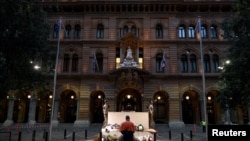Many Australians would be reluctant to leave their homes or gather in large groups even if the nation's COVID-19 restrictions are eased or lifted, according to a new study. Australia has had 6,849 confirmed coronavirus cases. Almost 5,900 patients have recovered, but 96 people have died with the virus.
COVID-19 was first confirmed in Australia in late January 2020. To try to curb the spread of the highly infectious disease the government closed Australia’s international borders, and imposed lockdowns on much of society. Cafes and bars have been closed, along with gyms, many schools and cinemas. Strict social distancing measures have also been mandated, and there have been fines for those who flout them.
But as the curve of new infections is flattened, there is an expectation that some of the restrictions could soon be eased, or even lifted.
Australians are desperate for life to return to normal, but new data from Vox Pop Labs, a private research company, and the Australian Broadcasting Corporations (ABC) has found many will be reluctant to embrace personal freedoms when the restrictions are relaxed.
The survey of 2,225 people has revealed that only one in eight Australians would go to a large event, fewer than one in five would fly, and only 40 per cent would go to a bar or restaurant.
Anne-Marie Turner is a physician who suffers from arthritis and is considered at high risk from COVID-19. She told Australia’s ABC that she would stay home even when disease controls are wound back.
“You know you are not exposing yourself potentially to this virus. You know, you can keep control over your own environment. You know, we love going out to restaurants, we love going to movies, we love going to the theatre, we love going to see music performances. I do not think we will be doing that for a long time. If there was no vaccine and this virus was still prevalent, yeah, I think my lifestyle is going to be quite curtailed long-term,” Turner said.
The findings of the research could have significant consequences for sectors worst hit by the COVID-19 pandemic, including the arts, hospitality and aviation.
The government in Canberra is expected to announce Friday a timetable for some national restrictions to be eased.
Officials now estimate that the cost to the Australian economy for every week COVID-19 restrictions remain in place is $2.5 billion.
Unemployment is expected to double and hit 10 per cent. The last recession here was in the early 1990s. There is a gloomy expectation among experts that Australia’s proud record of uninterrupted economic growth will soon come to a shuddering halt.




